Boardman J., Hammond N.G. L. The Cambridge Ancient History Volume 3, Part 3: The Expansion of the Greek World, Eighth to Sixth Centuries BC
Подождите немного. Документ загружается.

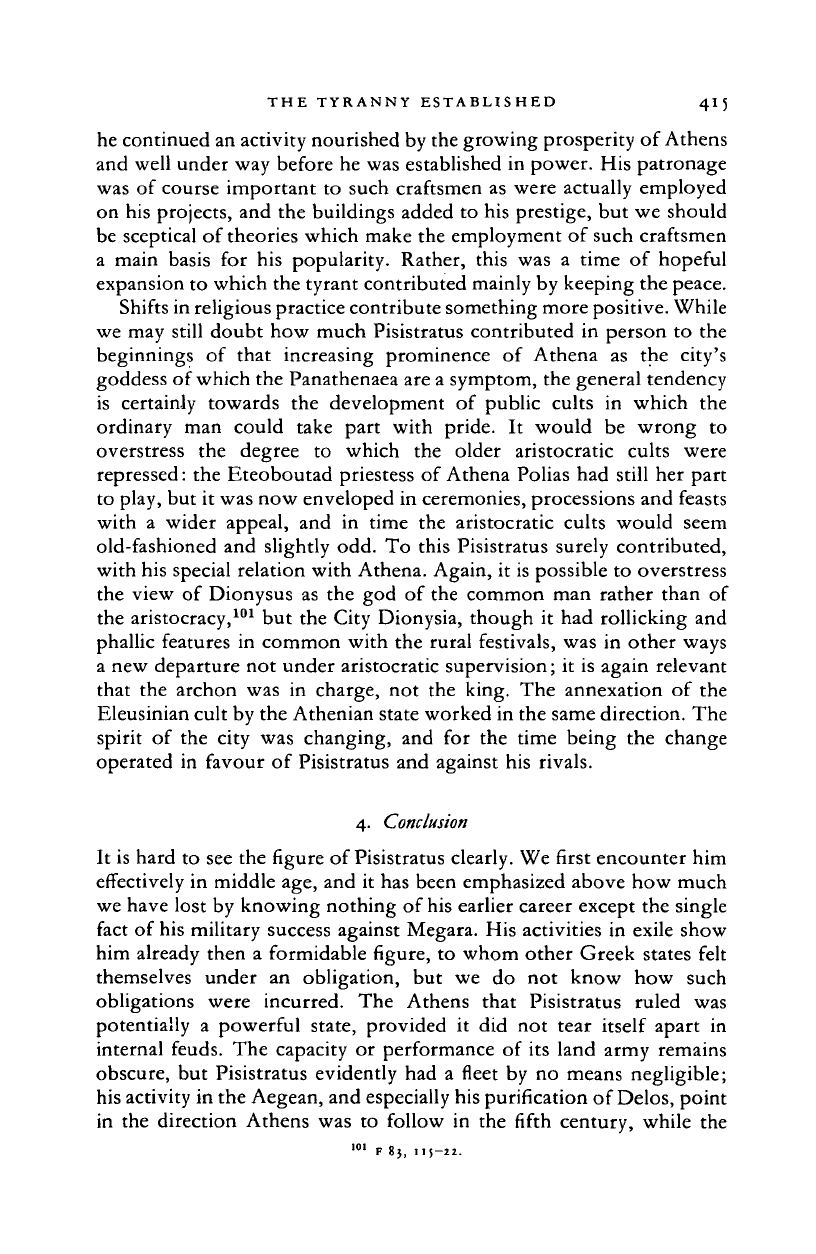
THE TYRANNY ESTABLISHED 41
5
he continued an activity nourished by the growing prosperity of Athens
and well under way before he was established in power. His patronage
was of course important to such craftsmen as were actually employed
on his projects, and the buildings added to his prestige, but we should
be sceptical of theories which make the employment of such craftsmen
a main basis for his popularity. Rather, this was a time of hopeful
expansion to which the tyrant contributed mainly by keeping the peace.
Shifts in religious practice contribute something more positive. While
we may still doubt how much Pisistratus contributed in person to the
beginnings of that increasing prominence of Athena as the city's
goddess of which the Panathenaea are a symptom, the general tendency
is certainly towards the development of public cults in which the
ordinary man could take part with pride. It would be wrong to
overstress the degree to which the older aristocratic cults were
repressed: the Eteoboutad priestess of Athena Polias had still her part
to play, but it was now enveloped in ceremonies, processions and feasts
with a wider appeal, and in time the aristocratic cults would seem
old-fashioned and slightly odd. To this Pisistratus surely contributed,
with his special relation with Athena. Again, it is possible to overstress
the view of Dionysus as the god of the common man rather than of
the aristocracy,
101
but the City Dionysia, though it had rollicking and
phallic features in common with the rural festivals, was in other ways
a new departure not under aristocratic supervision; it is again relevant
that the archon was in charge, not the king. The annexation of the
Eleusinian cult by the Athenian state worked in the same direction. The
spirit of the city was changing, and for the time being the change
operated in favour of Pisistratus and against his rivals.
4.
Conclusion
It is hard to see the figure of Pisistratus clearly. We first encounter him
effectively in middle age, and it has been emphasized above how much
we have lost by knowing nothing of his earlier career except the single
fact of his military success against Megara. His activities in exile show
him already then a formidable figure, to whom other Greek states felt
themselves under an obligation, but we do not know how such
obligations were incurred. The Athens that Pisistratus ruled was
potentially a powerful state, provided it did not tear itself apart in
internal feuds. The capacity or performance of its land army remains
obscure, but Pisistratus evidently had a fleet by no means negligible;
his activity in the Aegean, and especially his purification of
Delos,
point
in the direction Athens was to follow in the fifth century, while the
101
F 83, IIJ-22.
Cambridge Histories Online © Cambridge University Press, 2008
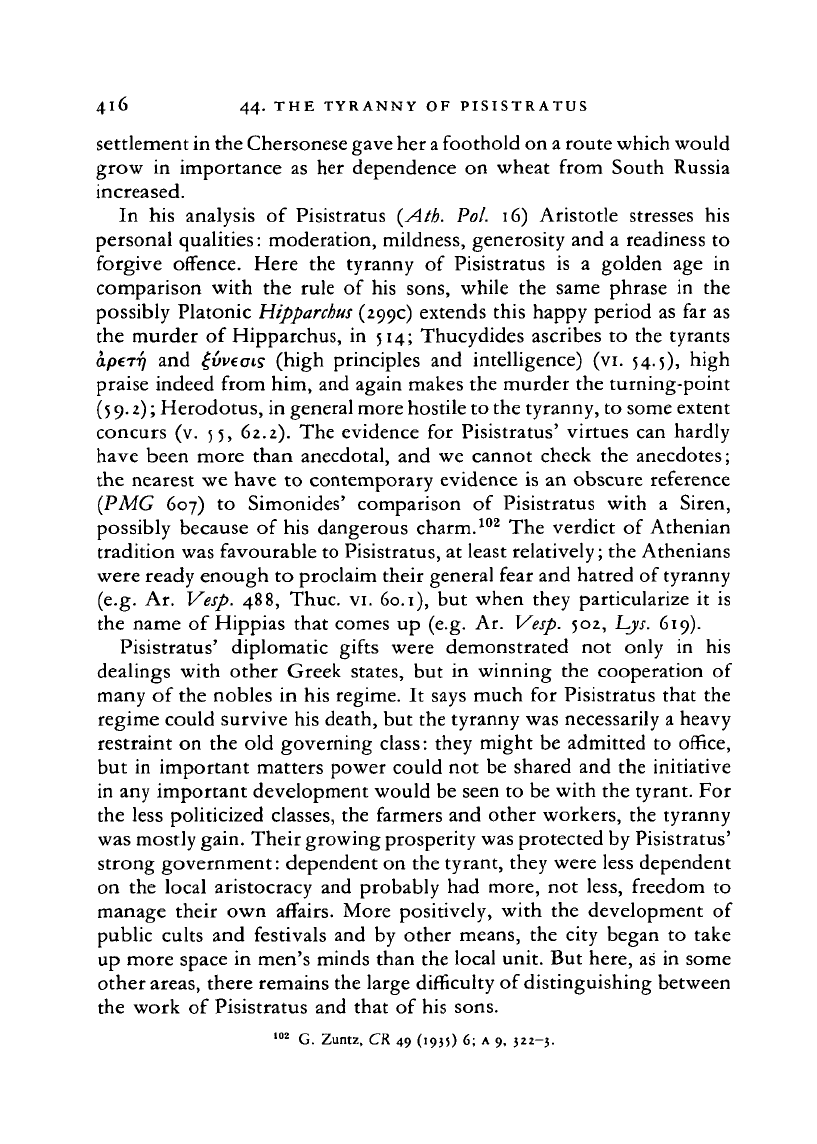
4l6 44. THE TYRANNY OF PISISTRATUS
settlement in the Chersonese gave her
a
foothold on a route which would
grow in importance as her dependence on wheat from South Russia
increased.
In his analysis
of
Pisistratus (Ath. Pol. 16) Aristotle stresses his
personal qualities: moderation, mildness, generosity and a readiness to
forgive offence. Here the tyranny
of
Pisistratus
is a
golden age
in
comparison with the rule of his sons, while the same phrase in the
possibly Platonic
Hipparchus
(299c) extends this happy period as far as
the murder of Hipparchus, in 514; Thucydides ascribes to the tyrants
aperq and £vveois (high principles and intelligence) (vi. 54.5), high
praise indeed from him, and again makes the murder the turning-point
(59.2);
Herodotus, in general more hostile to the tyranny, to some extent
concurs (v. 55, 62.2). The evidence for Pisistratus' virtues can hardly
have been more than anecdotal, and we cannot check the anecdotes;
the nearest we have to contemporary evidence is an obscure reference
(PMG 607)
to
Simonides' comparison
of
Pisistratus with
a
Siren,
possibly because of his dangerous charm.
102
The verdict of Athenian
tradition was favourable to Pisistratus, at least relatively; the Athenians
were ready enough to proclaim their general fear and hatred of tyranny
(e.g. Ar. Vesp. 488, Thuc. vi. 60.1), but when they particularize
it
is
the name of Hippias that comes up (e.g. Ar. Vesp. 502, Lys. 619).
Pisistratus' diplomatic gifts were demonstrated not only
in his
dealings with other Greek states, but in winning the cooperation of
many of the nobles in his regime. It says much for Pisistratus that the
regime could survive his death, but the tyranny was necessarily a heavy
restraint on the old governing class: they might be admitted to office,
but in important matters power could not be shared and the initiative
in any important development would be seen to be with the tyrant. For
the less politicized classes, the farmers and other workers, the tyranny
was mostly gain. Their growing prosperity was protected by Pisistratus'
strong government: dependent on the tyrant, they were less dependent
on the local aristocracy and probably had more, not less, freedom to
manage their own affairs. More positively, with the development of
public cults and festivals and by other means, the city began to take
up more space in men's minds than the local unit. But here, as in some
other areas, there remains the large difficulty of distinguishing between
the work of Pisistratus and that of his sons.
102
G.
Zuntz, CR 49 (1935)
6;
A
9,
322-3.
Cambridge Histories Online © Cambridge University Press, 2008
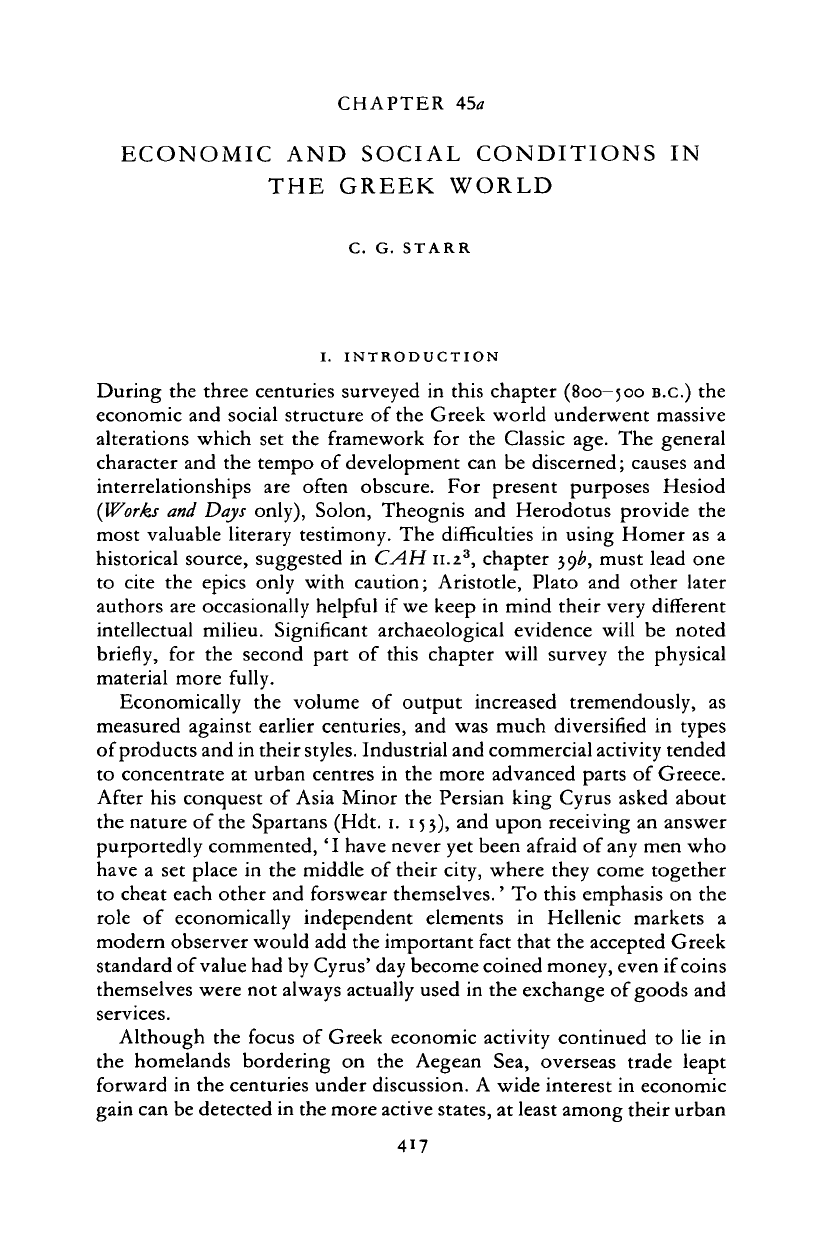
CHAPTER 45a
ECONOMIC
AND
SOCIAL CONDITIONS
IN
THE GREEK WORLD
C. G. STARR
I. INTRODUCTION
During the three centuries surveyed
in
this chapter (800-500
B.C.)
the
economic and social structure
of
the Greek world underwent massive
alterations which
set
the framework
for
the
Classic age. The general
character and the tempo
of
development can
be
discerned; causes and
interrelationships
are
often obscure.
For
present purposes Hesiod
{Works and Days only), Solon, Theognis
and
Herodotus provide
the
most valuable literary testimony. The difficulties
in
using Homer as
a
historical source, suggested
in CAH
11.z
3
, chapter 39^, must lead one
to cite
the
epics only with caution; Aristotle, Plato
and
other later
authors are occasionally helpful
if
we keep in mind their very different
intellectual milieu. Significant archaeological evidence will
be
noted
briefly,
for the
second part
of
this chapter will survey
the
physical
material more fully.
Economically
the
volume
of
output increased tremendously,
as
measured against earlier centuries,
and
was much diversified
in
types
of products and in their
styles.
Industrial and commercial activity tended
to concentrate
at
urban centres
in
the more advanced parts
of
Greece.
After his conquest
of
Asia Minor the Persian king Cyrus asked about
the nature
of
the Spartans (Hdt. 1.
15
3),
and upon receiving an answer
purportedly commented,
'I
have never yet been afraid of any men who
have
a
set place
in
the middle
of
their city, where they come together
to cheat each other and forswear themselves.' To this emphasis on the
role
of
economically independent elements
in
Hellenic markets
a
modern observer would add the important fact that the accepted Greek
standard of value had by Cyrus' day become coined money, even if coins
themselves were not always actually used in the exchange of goods and
services.
Although
the
focus
of
Greek economic activity continued
to
lie
in
the homelands bordering
on the
Aegean
Sea,
overseas trade leapt
forward
in
the centuries under discussion. A wide interest in economic
gain can be detected in the more active states, at least among their urban
Cambridge Histories Online © Cambridge University Press, 2008
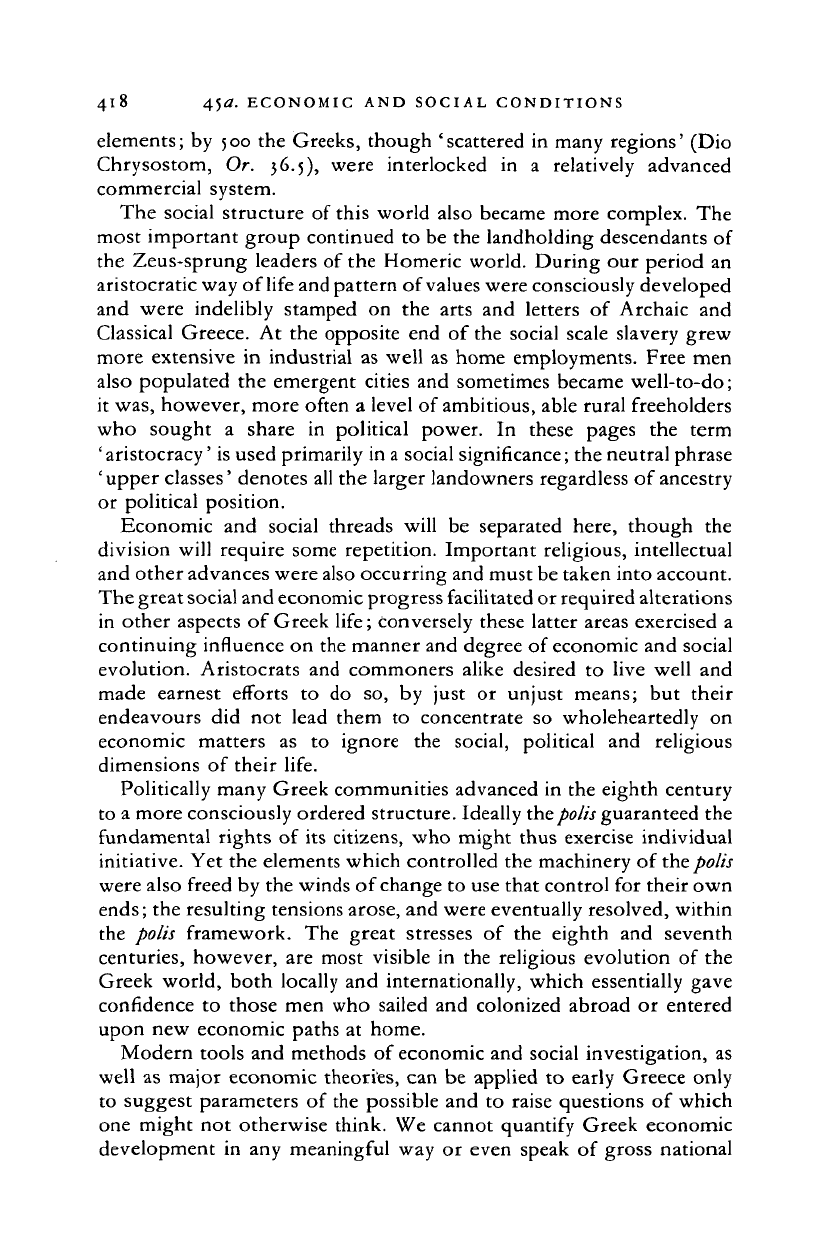
418 45a. ECONOMIC AND SOCIAL CONDITIONS
elements; by 500 the Greeks, though 'scattered in many regions' (Dio
Chrysostom,
Or.
36.5), were interlocked
in a
relatively advanced
commercial system.
The social structure of this world also became more complex. The
most important group continued to be the landholding descendants of
the Zeus-sprung leaders of the Homeric world. During our period an
aristocratic way of life and pattern of values were consciously developed
and were indelibly stamped
on the
arts and letters
of
Archaic
and
Classical Greece. At the opposite end of the social scale slavery grew
more extensive
in
industrial as well as home employments. Free men
also populated the emergent cities and sometimes became well-to-do;
it was, however, more often
a
level of ambitious, able rural freeholders
who sought
a
share
in
political power.
In
these pages
the
term
'aristocracy' is used primarily in
a
social significance; the neutral phrase
'upper classes' denotes all the larger landowners regardless of ancestry
or political position.
Economic
and
social threads will
be
separated here, though
the
division will require some repetition. Important religious, intellectual
and other advances were also occurring and must be taken into account.
The great social and economic progress facilitated or required alterations
in other aspects of Greek life; conversely these latter areas exercised
a
continuing influence on the manner and degree of economic and social
evolution. Aristocrats and commoners alike desired
to
live well and
made earnest efforts
to do so, by
just
or
unjust means;
but
their
endeavours
did not
lead them
to
concentrate
so
wholeheartedly
on
economic matters
as to
ignore
the
social, political
and
religious
dimensions
of
their life.
Politically many Greek communities advanced in the eighth century
to a more consciously ordered structure. Ideally thepolis guaranteed the
fundamental rights
of
its citizens, who might thus exercise individual
initiative. Yet the elements which controlled the machinery
of
the
po/is
were also freed by the winds of change to use that control for their own
ends;
the resulting tensions arose, and were eventually resolved, within
the polis framework. The great stresses
of
the eighth
and
seventh
centuries, however, are most visible
in
the religious evolution
of
the
Greek world, both locally and internationally, which essentially gave
confidence
to
those men who sailed and colonized abroad
or
entered
upon new economic paths at home.
Modern tools and methods of economic and social investigation,
as
well as major economic theories, can be applied
to
early Greece only
to suggest parameters
of
the possible and
to
raise questions
of
which
one might not otherwise think. We cannot quantify Greek economic
development
in
any meaningful way
or
even speak
of
gross national
Cambridge Histories Online © Cambridge University Press, 2008
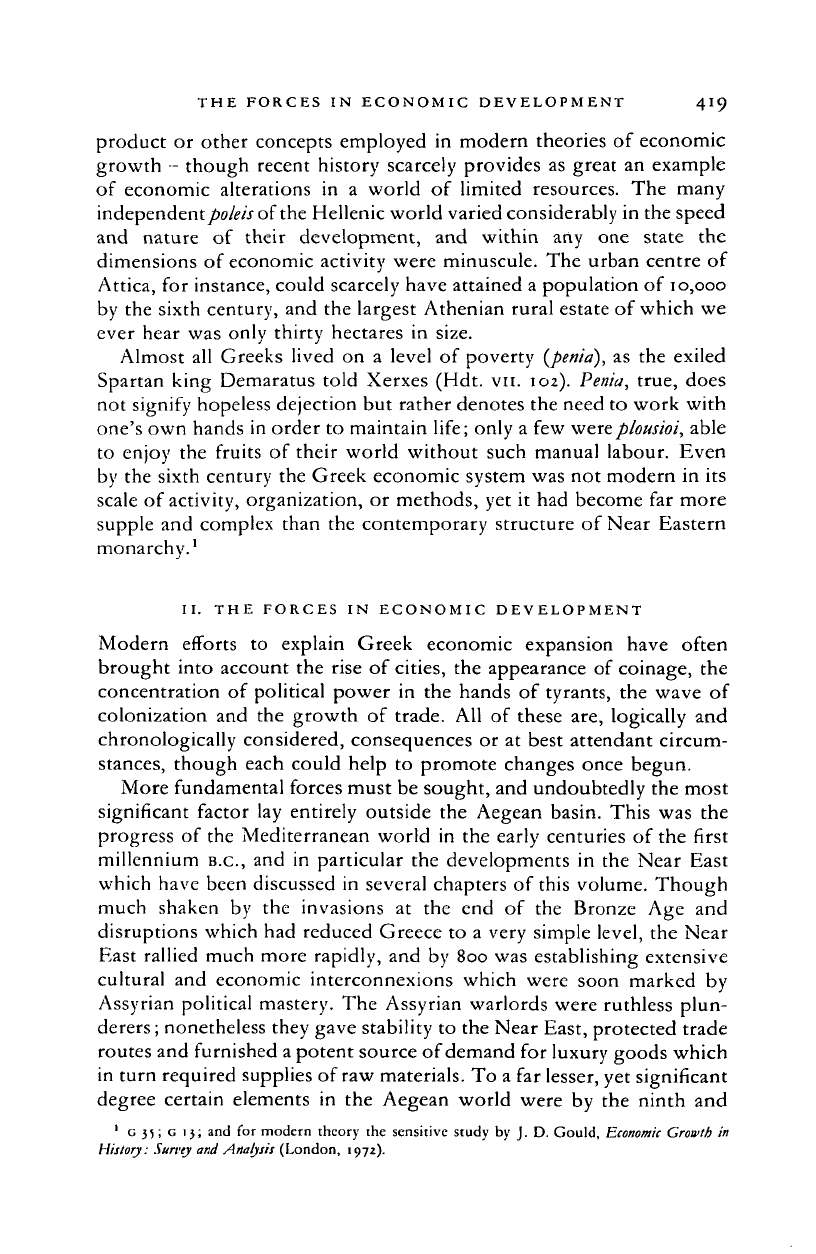
THE FORCES IN ECONOMIC DEVELOPMENT 419
product
or
other concepts employed
in
modern theories
of
economic
growth
-
though recent history scarcely provides as great an example
of economic alterations
in a
world
of
limited resources. The many
independent^Ww/of the Hellenic world varied considerably in the speed
and nature
of
their development,
and
within
any one
state
the
dimensions of economic activity were minuscule. The urban centre of
Attica, for instance, could scarcely have attained a population
of
10,000
by the sixth century, and the largest Athenian rural estate of which we
ever hear was only thirty hectares
in
size.
Almost all Greeks lived
on a
level
of
poverty
(penia),
as the exiled
Spartan king Demaratus told Xerxes (Hdt. vn. 102).
Penia,
true, does
not signify hopeless dejection but rather denotes the need to work with
one's own hands in order to maintain life; only a few wereplousioi, able
to enjoy the fruits
of
their world without such manual labour. Even
by the sixth century the Greek economic system was not modern in its
scale of activity, organization,
or
methods, yet
it
had become far more
supple and complex than the contemporary structure of Near Eastern
monarchy.
1
II.
THE FORCES IN ECONOMIC DEVELOPMENT
Modern efforts
to
explain Greek economic expansion have often
brought into account the rise
of
cities, the appearance
of
coinage, the
concentration
of
political power
in
the hands
of
tyrants, the wave
of
colonization and the growth
of
trade. All
of
these are, logically and
chronologically considered, consequences or
at
best attendant circum-
stances, though each could help
to
promote changes once begun.
More fundamental forces must be sought, and undoubtedly the most
significant factor lay entirely outside the Aegean basin. This was
the
progress
of
the Mediterranean world
in
the early centuries
of
the first
millennium B.C., and
in
particular the developments
in
the Near East
which have been discussed in several chapters of this volume. Though
much shaken
by the
invasions
at the end of the
Bronze Age
and
disruptions which had reduced Greece to a very simple level, the Near
East rallied much more rapidly, and by 800 was establishing extensive
cultural and economic interconnexions which were soon marked
by
Assyrian political mastery. The Assyrian warlords were ruthless plun-
derers; nonetheless they gave stability to the Near East, protected trade
routes and furnished a potent source of demand for luxury goods which
in turn required supplies of raw materials. To a far lesser, yet significant
degree certain elements
in the
Aegean world were
by
the ninth and
1
c
3;; G 13; and for modern theory the sensitive study by
J.
D. Gould,
Economic Growth
in
History:
Survey
and Analysis (London, 1972).
Cambridge Histories Online © Cambridge University Press, 2008
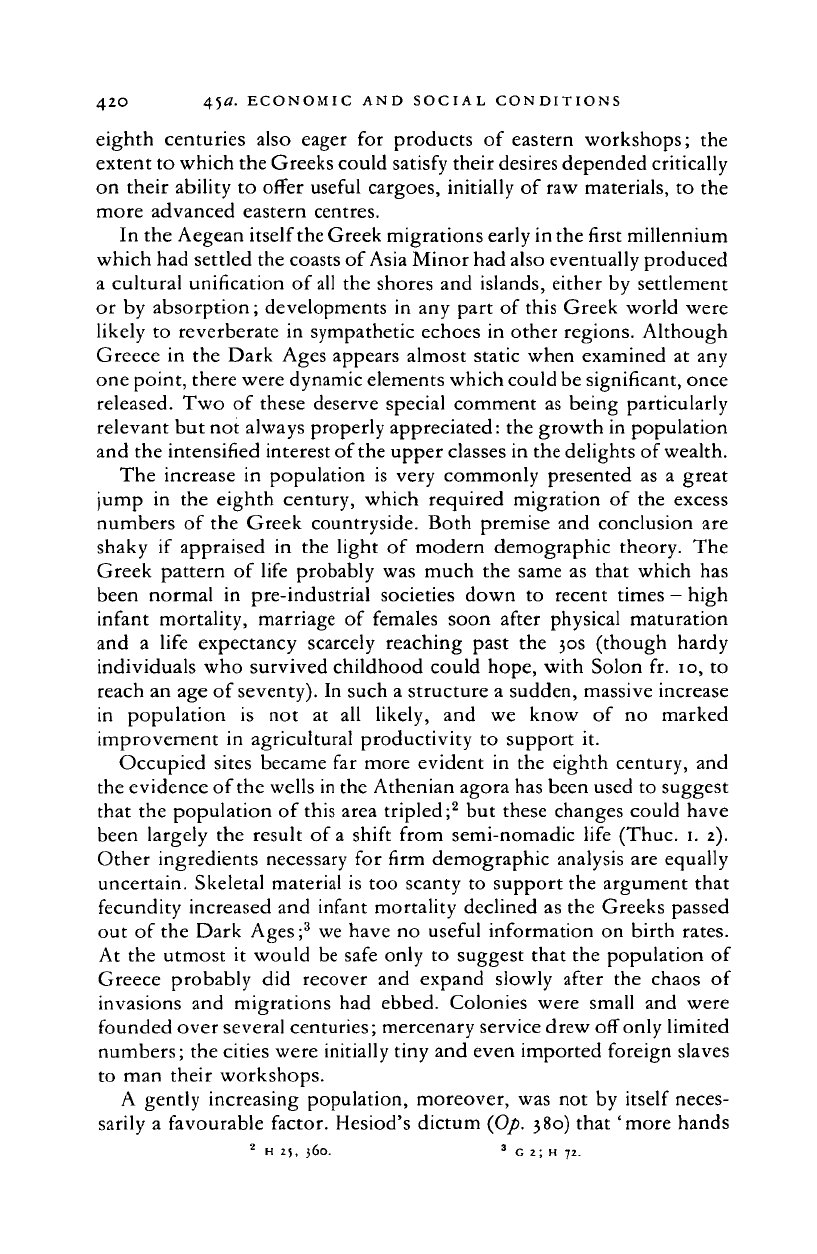
42O 45^- ECONOMIC AND SOCIAL CONDITIONS
eighth centuries also eager for products of eastern workshops; the
extent to which the Greeks could satisfy their desires depended critically
on their ability to offer useful cargoes, initially of raw materials, to the
more advanced eastern centres.
In the Aegean itself the Greek migrations early in the first millennium
which had settled the coasts of Asia Minor had also eventually produced
a cultural unification of
all
the shores and islands, either by settlement
or by absorption; developments in any part of this Greek world were
likely to reverberate in sympathetic echoes in other regions. Although
Greece in the Dark Ages appears almost static when examined at any
one point, there were dynamic elements which could be significant, once
released. Two of these deserve special comment as being particularly
relevant but not always properly appreciated: the growth in population
and the intensified interest of
the
upper classes in the delights of wealth.
The increase in population is very commonly presented as a great
jump
in
the eighth century, which required migration of the excess
numbers of the Greek countryside. Both premise and conclusion are
shaky
if
appraised in the light of modern demographic theory. The
Greek pattern of life probably was much the same as that which has
been normal
in
pre-industrial societies down
to
recent times
—
high
infant mortality, marriage of females soon after physical maturation
and
a
life expectancy scarcely reaching past the 30s (though hardy
individuals who survived childhood could hope, with Solon fr. 10, to
reach an age of seventy). In such a structure a sudden, massive increase
in population
is not at all
likely, and
we
know
of
no marked
improvement in agricultural productivity to support it.
Occupied sites became far more evident in the eighth century, and
the evidence of the wells in the Athenian agora has been used to suggest
that the population of this area tripled;
2
but these changes could have
been largely the result of a shift from semi-nomadic life (Thuc. 1. 2).
Other ingredients necessary for firm demographic analysis are equally
uncertain. Skeletal material is too scanty to support the argument that
fecundity increased and infant mortality declined as the Greeks passed
out of the Dark Ages;
3
we have no useful information on birth rates.
At the utmost it would be safe only to suggest that the population of
Greece probably did recover and expand slowly after the chaos of
invasions and migrations had ebbed. Colonies were small and were
founded over several centuries; mercenary service drew off only limited
numbers; the cities were initially tiny and even imported foreign slaves
to man their workshops.
A gently increasing population, moreover, was not by itself neces-
sarily a favourable factor. Hesiod's dictum
{Op.
380) that 'more hands
2
H 2J,
360.
3
G 2; H 72.
Cambridge Histories Online © Cambridge University Press, 2008
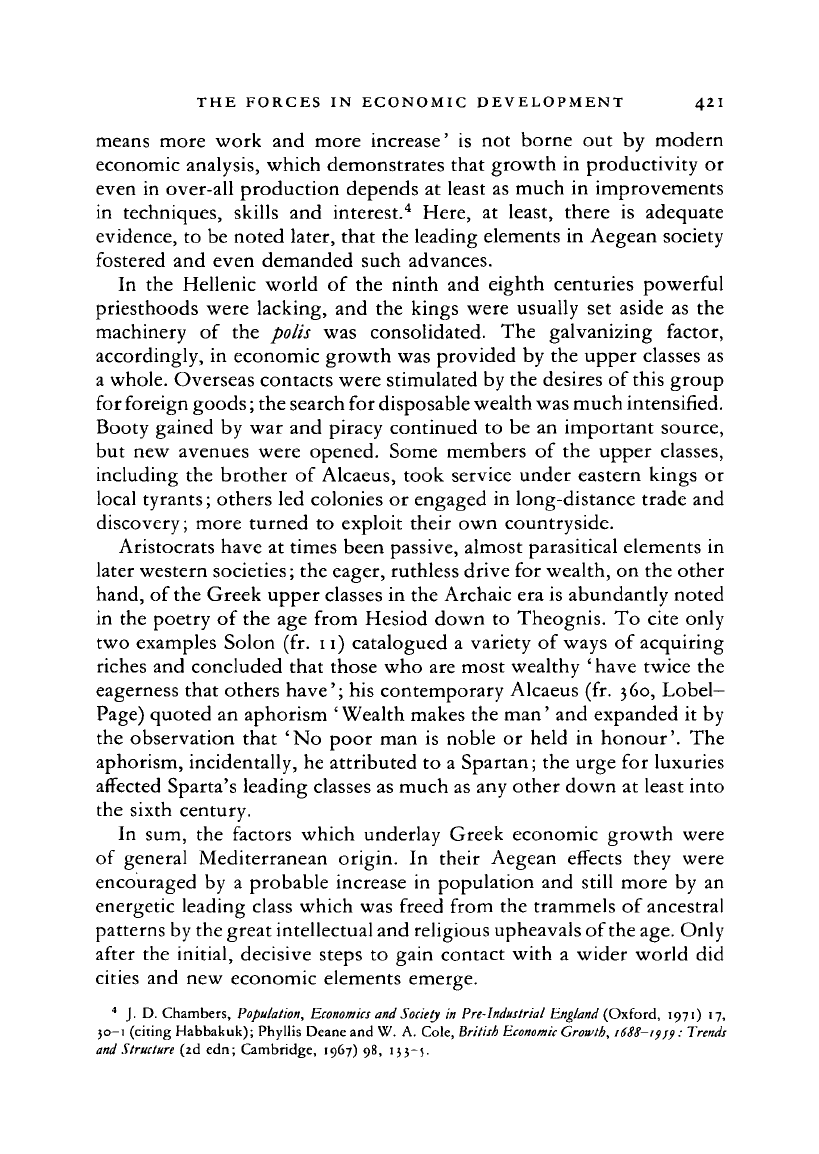
THE FORCES IN ECONOMIC DEVELOPMENT 421
means more work and more increase'
is
not borne out by modern
economic analysis, which demonstrates that growth in productivity or
even in over-all production depends at least as much in improvements
in techniques, skills and interest.
4
Here,
at
least, there
is
adequate
evidence, to be noted later, that the leading elements in Aegean society
fostered and even demanded such advances.
In the Hellenic world of the ninth and eighth centuries powerful
priesthoods were lacking, and the kings were usually set aside as the
machinery
of
the polis was consolidated. The galvanizing factor,
accordingly, in economic growth was provided by the upper classes as
a whole. Overseas contacts were stimulated by the desires of this group
for foreign goods; the search for disposable wealth
was
much intensified.
Booty gained by war and piracy continued to be an important source,
but new avenues were opened. Some members of the upper classes,
including the brother of Alcaeus, took service under eastern kings or
local tyrants; others led colonies or engaged in long-distance trade and
discovery; more turned to exploit their own countryside.
Aristocrats have at times been passive, almost parasitical elements in
later western societies; the eager, ruthless drive for wealth, on the other
hand, of the Greek upper classes in the Archaic era is abundantly noted
in the poetry of the age from Hesiod down to Theognis. To cite only
two examples Solon (fr. n) catalogued a variety of ways of acquiring
riches and concluded that those who are most wealthy ' have twice the
eagerness that others have'; his contemporary Alcaeus (fr. 360, Lobel—
Page) quoted an aphorism 'Wealth makes the man' and expanded it by
the observation that 'No poor man is noble or held in honour'. The
aphorism, incidentally, he attributed to a Spartan; the urge for luxuries
affected Sparta's leading classes as much as any other down at least into
the sixth century.
In sum, the factors which underlay Greek economic growth were
of general Mediterranean origin.
In
their Aegean effects they were
encouraged by a probable increase in population and still more by an
energetic leading class which was freed from the trammels of ancestral
patterns by the great intellectual and religious upheavals of the
age.
Only
after the initial, decisive steps to gain contact with a wider world did
cities and new economic elements emerge.
4
J.
D. Chambers, Population, Economics and Society in Pre-Industrial England (Oxford, 1971) 17,
30-1 (citing Habbakuk); Phyllis Deane and W. A. Cole, British Economic Growth, i688-i<)f<): Trends
and Structure
{id
edn; Cambridge, 1967) 98, 153-5.
Cambridge Histories Online © Cambridge University Press, 2008
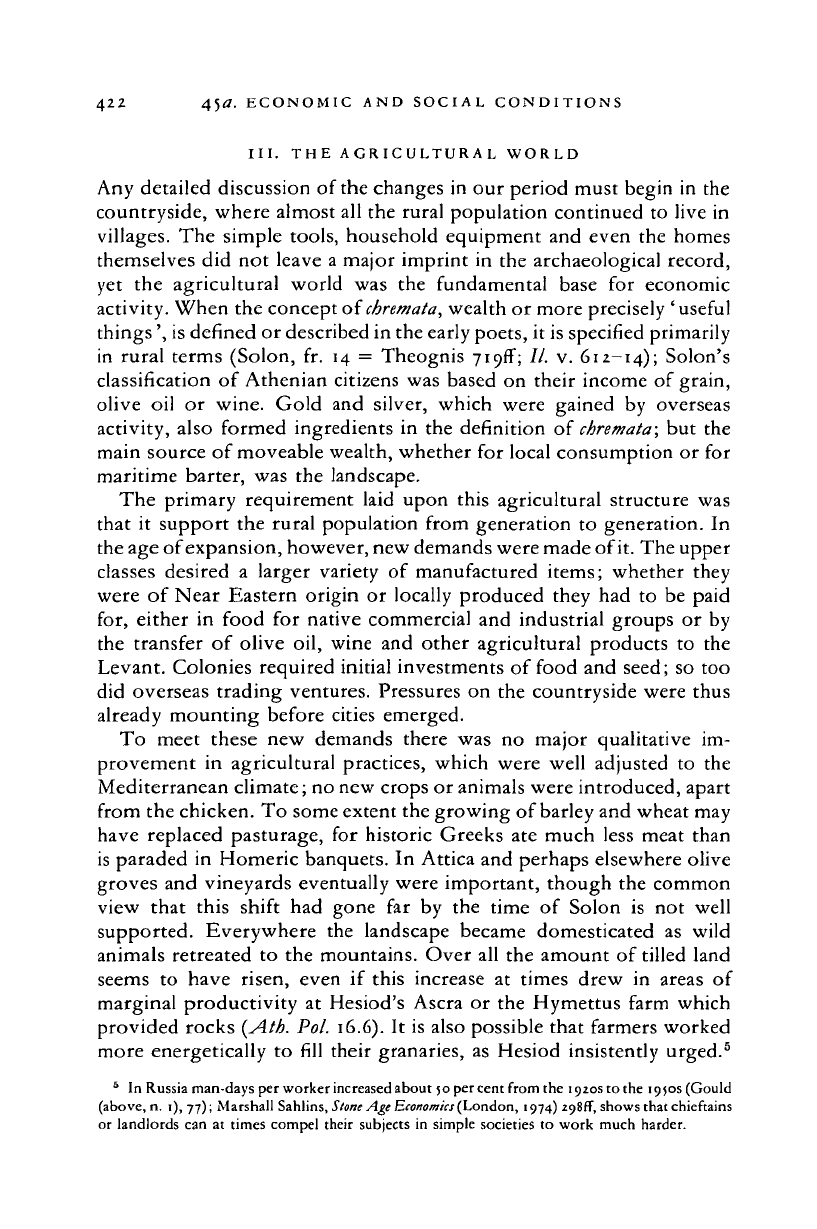
42
2
45
a
- ECONOMIC AND SOCIAL CONDITIONS
III.
THE AGRICULTURAL WORLD
Any detailed discussion of the changes in our period must begin
in
the
countryside, where almost all the rural population continued
to
live
in
villages. The simple tools, household equipment and even the homes
themselves did not leave a major imprint
in
the archaeological record,
yet
the
agricultural world
was the
fundamental base
for
economic
activity. When the concept of
cbremata,
wealth or more precisely ' useful
things', is defined or described in the early poets, it is specified primarily
in rural terms (Solon,
fr.
14
=
Theognis
71
c>ff;
//. v.
612-14); Solon's
classification
of
Athenian citizens was based
on
their income
of
grain,
olive
oil or
wine. Gold
and
silver, which were gained
by
overseas
activity, also formed ingredients
in
the definition
of
chremata;
but the
main source
of
moveable wealth, whether for local consumption or for
maritime barter, was the landscape.
The primary requirement laid upon this agricultural structure was
that
it
support the rural population from generation
to
generation.
In
the age of expansion, however, new demands were made of it. The upper
classes desired
a
larger variety
of
manufactured items; whether they
were
of
Near Eastern origin
or
locally produced they had
to be
paid
for, either
in
food
for
native commercial and industrial groups
or
by
the transfer
of
olive oil, wine
and
other agricultural products
to the
Levant. Colonies required initial investments
of
food and seed; so too
did overseas trading ventures. Pressures
on
the countryside were thus
already mounting before cities emerged.
To meet these
new
demands there was
no
major qualitative
im-
provement
in
agricultural practices, which were well adjusted
to the
Mediterranean climate; no new crops or animals were introduced, apart
from the chicken. To some extent the growing of barley and wheat may
have replaced pasturage,
for
historic Greeks ate much less meat than
is paraded
in
Homeric banquets.
In
Attica and perhaps elsewhere olive
groves and vineyards eventually were important, though the common
view that this shift
had
gone
far by the
time
of
Solon
is not
well
supported. Everywhere
the
landscape became domesticated
as
wild
animals retreated
to
the mountains. Over all the amount
of
tilled land
seems
to
have risen, even
if
this increase
at
times drew
in
areas
of
marginal productivity
at
Hesiod's Ascra
or
the Hymettus farm which
provided rocks (A.tb. Pol. 16.6).
It
is also possible that farmers worked
more energetically
to
fill their granaries,
as
Hesiod insistently urged.
5
5
In Russia man-days per worker increased about 50 percent from the 1920s to the 1950s (Gould
(above, n. 1), 77); Marshall Sahlins,
Slone
Age
Economics
(London, 1974)
298ff,
shows that chieftains
or landlords can
at
times compel their subjects
in
simple societies
to
work much harder.
Cambridge Histories Online © Cambridge University Press, 2008
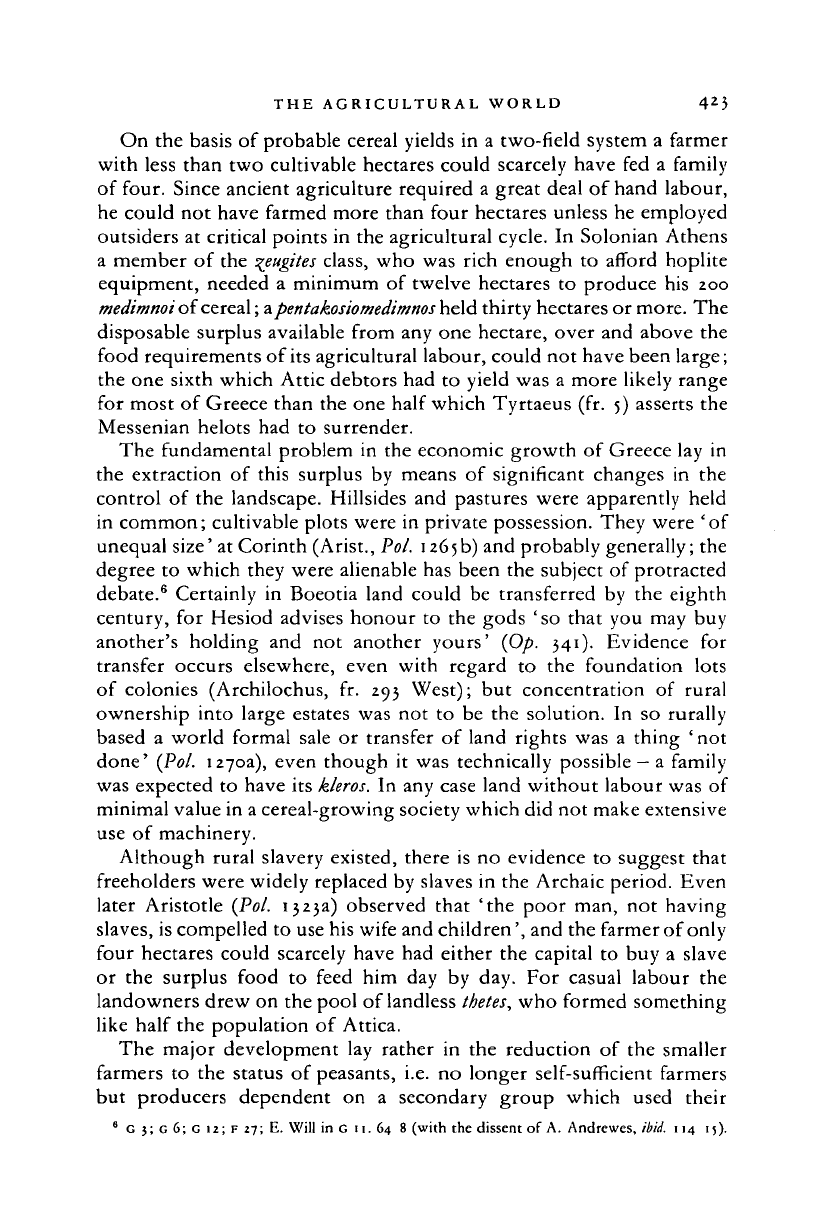
THE AGRICULTURAL WORLD 4
2
3
On the basis of probable cereal yields in a two-field system
a
farmer
with less than two cultivable hectares could scarcely have fed
a
family
of four. Since ancient agriculture required a great deal of hand labour,
he could not have farmed more than four hectares unless he employed
outsiders at critical points in the agricultural cycle. In Solonian Athens
a member
of
the
^eugites
class, who was rich enough
to
afford hoplite
equipment, needed
a
minimum
of
twelve hectares
to
produce his 200
medimnoi
of cereal; apentakosiomedimnos held thirty hectares or more. The
disposable surplus available from any one hectare, over and above the
food requirements of
its
agricultural labour, could not have been large;
the one sixth which Attic debtors had to yield was a more likely range
for most of Greece than the one half which Tyrtaeus (fr. 5) asserts the
Messenian helots had
to
surrender.
The fundamental problem in the economic growth of Greece lay
in
the extraction
of
this surplus
by
means
of
significant changes
in the
control
of
the landscape. Hillsides and pastures were apparently held
in common; cultivable plots were in private possession. They were 'of
unequal size' at Corinth (Arist.,
Pol.
1265b) and probably generally; the
degree to which they were alienable has been the subject of protracted
debate.
6
Certainly
in
Boeotia land could
be
transferred
by
the eighth
century, for Hesiod advises honour to the gods 'so that you may buy
another's holding
and not
another yours' (Op. 341). Evidence
for
transfer occurs elsewhere, even with regard
to the
foundation lots
of colonies (Archilochus,
fr.
293 West);
but
concentration
of
rural
ownership into large estates was not
to
be the solution.
In
so rurally
based
a
world formal sale
or
transfer
of
land rights was
a
thing ' not
done'
{Pol.
1270a), even though
it
was technically possible
—
a family
was expected to have its
kleros.
In any case land without labour was of
minimal value in a cereal-growing society which did not make extensive
use
of
machinery.
Although rural slavery existed, there is no evidence to suggest that
freeholders were widely replaced by slaves in the Archaic period. Even
later Aristotle (Pol. 1323a) observed that 'the poor man, not having
slaves, is compelled to use his wife and children', and the farmer of only
four hectares could scarcely have had either the capital
to
buy
a
slave
or the surplus food
to
feed him day
by
day. For casual labour
the
landowners drew on the pool of landless
thetes,
who formed something
like half the population
of
Attica.
The major development lay rather
in
the reduction
of
the smaller
farmers
to
the status of peasants, i.e. no longer self-sufficient farmers
but producers dependent
on a
secondary group which used their
' G
J;G6;G
u;F27;E. Will
in
G
11. 64 8 (with the dissent
of
A. Andrewes,
ibid.
114
1
j).
Cambridge Histories Online © Cambridge University Press, 2008
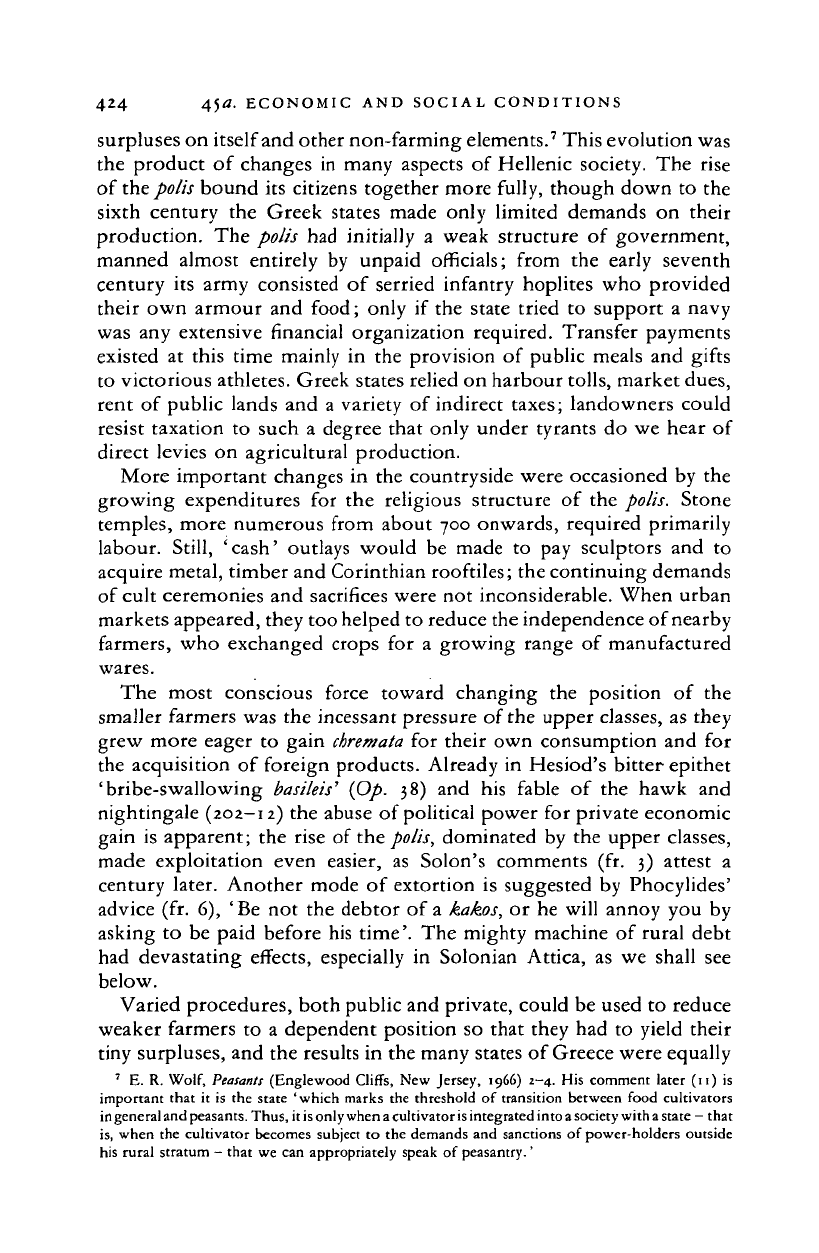
424 45
a
- ECONOMIC AND SOCIAL CONDITIONS
surpluses on itself and other non-farming elements.
7
This evolution was
the product
of
changes
in
many aspects
of
Hellenic society. The rise
of the
polis
bound its citizens together more fully, though down to the
sixth century
the
Greek states made only limited demands
on
their
production. The polis had initially
a
weak structure
of
government,
manned almost entirely
by
unpaid officials; from
the
early seventh
century its army consisted
of
serried infantry hoplites who provided
their own armour and food; only
if
the state tried
to
support
a
navy
was any extensive financial organization required. Transfer payments
existed
at
this time mainly
in
the provision
of
public meals and gifts
to victorious athletes. Greek states relied on harbour tolls, market dues,
rent
of
public lands and a variety of indirect taxes; landowners could
resist taxation
to
such
a
degree that only under tyrants do we hear of
direct levies on agricultural production.
More important changes
in
the countryside were occasioned by the
growing expenditures
for
the religious structure
of
the polis. Stone
temples, more numerous from about 700 onwards, required primarily
labour. Still, 'cash' outlays would
be
made
to
pay sculptors and
to
acquire metal, timber and Corinthian rooftiles; the continuing demands
of cult ceremonies and sacrifices were not inconsiderable. When urban
markets appeared, they too helped to reduce the independence of nearby
farmers, who exchanged crops
for a
growing range
of
manufactured
wares.
The most conscious force toward changing
the
position
of the
smaller farmers was the incessant pressure of the upper classes, as they
grew more eager
to
gain
chremata
for their own consumption and
for
the acquisition of foreign products. Already in Hesiod's bitter epithet
'bribe-swallowing basileis' {Op.
38) and his
fable
of
the hawk
and
nightingale (202—12) the abuse of political power for private economic
gain is apparent; the rise of the
polis,
dominated by the upper classes,
made exploitation even easier,
as
Solon's comments
(fr. 3)
attest
a
century later. Another mode
of
extortion is suggested by Phocylides'
advice (fr. 6), '
Be
not the debtor of a kakos,
or
he will annoy you by
asking
to
be paid before his time'. The mighty machine of rural debt
had devastating effects, especially
in
Solonian Attica,
as
we shall see
below.
Varied procedures, both public and private, could be used to reduce
weaker farmers
to a
dependent position so that they had
to
yield their
tiny surpluses, and the results in the many states of Greece were equally
7
E. R.
Wolf,
Peasants
(Englewood Cliffs, New Jersey, 1966) 2-4. His comment later (11)
is
important that
it is
the state 'which marks the threshold
of
transition between food cultivators
in
general and
peasants.
Thus, it
is
only when
a
cultivator
is
integrated into
a
society with
a
state
-
that
is,
when the cultivator becomes subject
to
the demands and sanctions of power-holders outside
his rural stratum
-
that we can appropriately speak
of
peasantry.'
Cambridge Histories Online © Cambridge University Press, 2008
